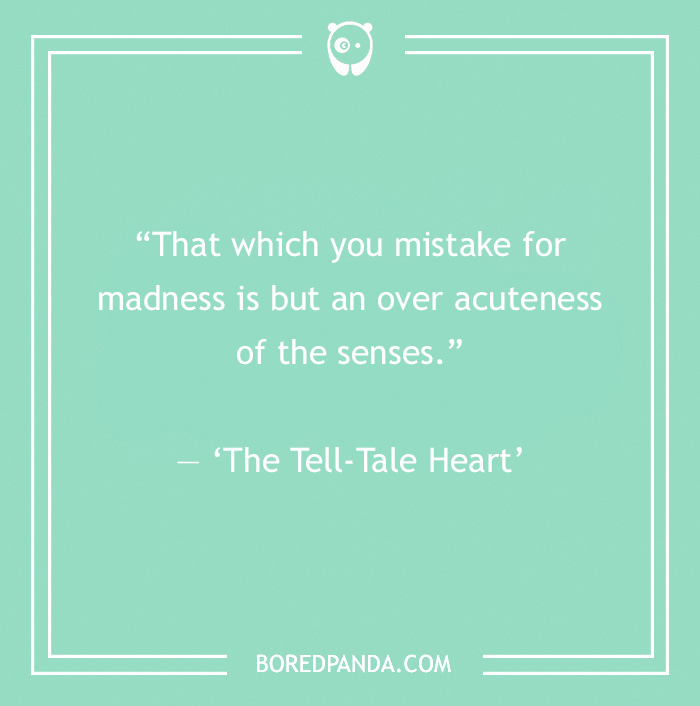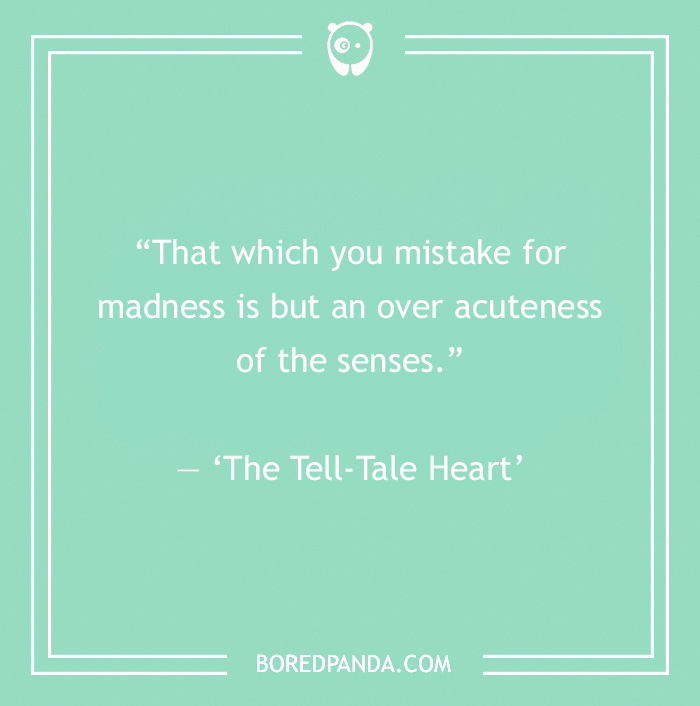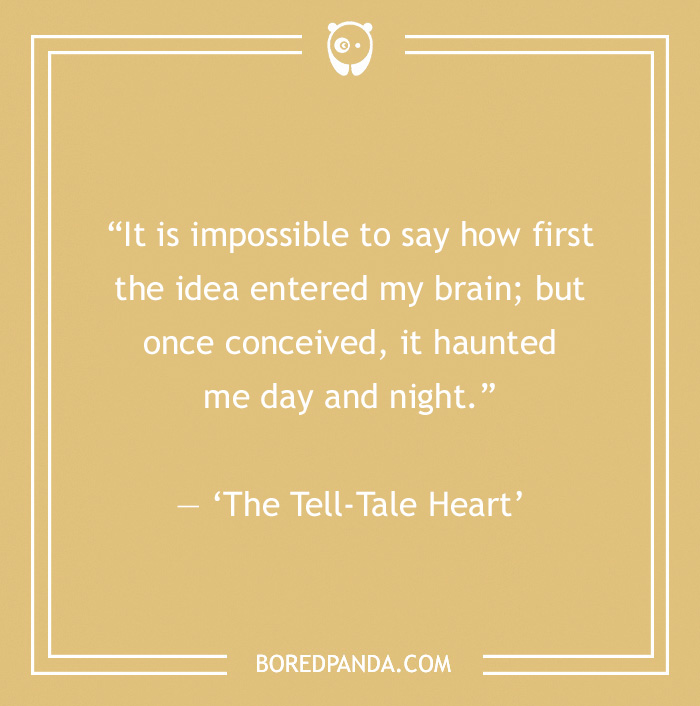Edgar Allan Poe, the OG master of horror stories and the forefather of science fiction, is to this day considered a central figure in American literature. And very rightfully so! Although his writing career was kick-started by his fearless literary reviews that gained him the nickname ‘tomahawk man,’ it was his poem The Raven that really put his works on the radar. And the rest is, well, history - Edgar Allan Poe’s quotes are among the most recited and beloved worldwide, both from his works and the things he had said or written in correspondence. Not to mention how many writers, movie directors, theater productions, and other pieces of pop culture he has inspired! Thus, to honor his literary genius, we are presenting our list dedicated to Edgar Allan Poe and his incredible quotes about life, death, and everything in between.
Edgar Allan Poe was a bit on the controversial side, having been married to his 13-year-old cousin and being a bona fide drunkard and substance abuser. However, that did not outshine his work at all. Some might even think that by succumbing to addictions, he was able to tap into that dark side of the human condition, pull it all out, and turn it into art nobody had ever seen before. In fact, he was so taken over by his writing that he became the first-ever well-known American writer to live solely, however poorly, from writing. The curse of a genius, perhaps.
Well, no matter how tumultuous his short life was, he did give us some of the best literary works ever, out of which we’ve chosen some of the most popular and famous quotes to share with you. Don’t expect them to be easy breezy - he was, after all, the master of mystique and macabre. Unlike other writers’ quotes, his explore the dark worlds within. So, scroll on down below and check the moving quotes out. Be sure to give the most electrifying ones your vote and share this article with anyone who needs a few mysterious quotes in their day.
This post may include affiliate links.
“Actually, I do have doubts, all the time. Any thinking person does. There are so many sides to every question.” — 'The Raven'
“Those who dream by day are cognizant of many things which escape those who dream only by night." — 'Eleonora'
“All that we see or seem Is but a dream within a dream.” — 'A Dream Within a Dream'
REVENGE SPELL THAT WORKS WITHIN 24 HOURS! DR. ITUA’S POWERFUL REVENGE SPELL TURNED MY PAIN INTO POWER CONTACT DR ITUA VIA EMAIL:(drituasteven@gmail. com) WHATSAPP +2347071347485 I never thought I’d ever need a revenge spell until betrayal left me broken. A person I trusted destroyed my peace, stripped me of my inheritance, and dragged me into suffering with no justice in sight. I was drowning in anger and betrayal… until I discovered Dr. Itua. I reached out in desperation, seeking justice through a revenge spell. Dr. Itua listened, understood.and assured me that some wounds can only be healed through spiritual justice.The result? His death spell worked perfectly. The enemy who tried to ruin and even k**l me is gone forever. Now, I have peace. My path is clear, and I’ve reclaimed my power.If someone is destroying your life, betraying your trust, or blocking your destiny, don't stay silent. Dr. Itua’s revenge spell is fast, real and effective. He also offers: Love & attraction spells Pro
 "Believe nothing you hear and only one half that you see." — 'The System of Doctor Tarr and Professor Fether'
"Believe nothing you hear and only one half that you see." — 'The System of Doctor Tarr and Professor Fether'
“I became insane, with long intervals of horrible sanity.” — 'Letter to George Washington Eveleth'
“If you wish to forget anything on the spot, make a note that this thing is to be remembered.” — 'Marginalia'
“Science has not yet taught us if madness is or is not the sublimity of the intelligence.”
It has now. Most highly intelligent people have depression to some extent. Its born of seeing, knowing, remembering and understanding too much of humanity, and history
 “That which you mistake for madness is but an over acuteness of the senses.” — 'The Tell-Tale Heart'
“That which you mistake for madness is but an over acuteness of the senses.” — 'The Tell-Tale Heart'
“I have absolutely no pleasure in the stimulants in which I sometimes so madly indulge. It has not been in the pursuit of pleasure that I have periled life and reputation and reason. It has been the desperate attempt to escape from torturing memories, from a sense of insupportable loneliness and a dread of some strange impending doom.” — 'Letter to Sarah H. Whitman'
“We should bear in mind that, in general, it is the object of our newspapers rather to create a sensation – to make a point – than to further the cause of truth.” — 'The Mystery of Marie Roget'
 “We loved with a love that was more than love.” — 'The Tell-Tale Heart'
“We loved with a love that was more than love.” — 'The Tell-Tale Heart'
“Melancholy is… the most legitimate of all the poetical tones.” — 'The Philosophy of Composition'
“Because it was my crime to have no one on Earth who cared for me, or loved me.” — 'Letter to John Allan'
 “The death of a beautiful woman is, unquestionably, the most poetical topic in the world." — 'The Philosophy of Composition'
“The death of a beautiful woman is, unquestionably, the most poetical topic in the world." — 'The Philosophy of Composition'
“Words have no power to impress the mind without the exquisite horror of their reality.” — 'The Narrative of Arthur Gordon Pym of Nantucket'
“A feeling, for which I have no name, has taken possession of my soul.” — 'Ms. Found in a Bottle'
“The boundaries which divide Life from Death are at best shadowy and vague. Who shall say where the one ends, and where the other begins?” — 'The Premature Burial'
“Music, when combined with a pleasurable idea, is poetry; music without the idea is simply music; the idea without the music is prose from its very definitiveness.” — 'Letter to Mr. B'
“Whether people grow fat by joking, or whether there is something in fat itself which predisposes to a joke, I have never been quite able to determine” — 'Hop-Frog'
"Experience has shown, and a true philosophy will always show, that a vast, perhaps the larger, portion of truth arises from the seemingly irrelevant." — 'The Mystery of Marie Rogêt'
“I dread the events of the future, not in themselves but in their results.” — 'The Fall of the House of Usher'
“Beauty of whatever kind, in its supreme development, invariably excites the sensitive soul to tears.” — 'The Philosophy of Composition'
“A million candles have burned themselves out. Still, I read on.” — 'The Cask of Amontillado'
“It is evident that we are hurrying onward to some exciting knowledge — some never-to-be-imparted secret, whose attainment is destruction.” — 'Tales of Mystery and Imagination'
"I call to mind flatness and dampness, and then all is madness - the madness of a memory which busies itself among forbidden things." — 'The Pit and the Pendulum'
 “There came forth in reply only a jingling of the bells. My heart grew sick–on account of the dampness of the catacombs.” — 'The Cask of Amontillado'
“There came forth in reply only a jingling of the bells. My heart grew sick–on account of the dampness of the catacombs.” — 'The Cask of Amontillado'
“It is by no means an irrational fancy that, in a future existence, we shall look upon what we think our present existence, as a dream.” — 'Marginalia'
“I would define, in brief, the poetry of words as the rhythmical creation of beauty.” — 'The Poetic Principle'
“Were I called on to define, very briefly, the term “Art,” I should call it 'The reproduction of what the Senses perceive in Nature through the veil of the soul.' The mere imitation, however accurate, of what is in Nature, entitles no man to the sacred name of 'Artist'.” — 'Marginalia'
 “There is something in the unselfish and self-sacrificing love of a brute, which goes directly to the heart of him who has had frequent occasion to test the paltry friendship and gossamer fidelity of mere Man.” — 'The Black Cat'
“There is something in the unselfish and self-sacrificing love of a brute, which goes directly to the heart of him who has had frequent occasion to test the paltry friendship and gossamer fidelity of mere Man.” — 'The Black Cat'
“That man is not truly brave who is afraid either to seem or to be, when it suits him, a coward.” — 'Marginalia'
“It is the nature of truth in general, as of some ores in particular, to be richest when most superficial.” — 'The Rationale of Verse'
“There are few persons who have not, at some period of their lives, amused themselves in retracing the steps by which particular conclusions of their own minds have been attained.” — 'The Murders in the Rue Morgue'
“No pictorial or sculptural combinations of points of human loveliness, do more than approach the living and breathing human beauty as it gladdens our daily path.” — 'The Landscape Garden'
“I was never really insane except upon occasions when my heart was touched." — 'Letter to Maria Clemm'
“Deep into that darkness peering, long I stood there, wondering, fearing, doubting, dreaming dreams no mortal ever dared to dream before.” — 'The Raven'
 “The true genius shudders at incompleteness — imperfection — and usually prefers silence to saying the something which is not everything that should be said.” — 'Marginalia'
“The true genius shudders at incompleteness — imperfection — and usually prefers silence to saying the something which is not everything that should be said.” — 'Marginalia'
“Men have called me mad; but the question is not yet settled, whether madness is or is not the loftiest intelligence– whether much that is glorious– whether all that is profound– does not spring from disease of thought– from moods of mind exalted at the expense of the general intellect.” — 'Eleonora'
“There are some secrets which do not permit themselves to be told.” —'The man of the crowd'
“The object, truth, or the satisfaction of the intellect, and the object, Passion, or the excitement of the heart, are, although attainable, to a certain extent, in poetry, far more readily attainable in prose.” — 'The Philosophy of Composition'
“A wrong is unredressed when retribution overtakes its redresser.” — 'The Cask of Amontillado'
“I have no faith in human perfectibility. I think that human exertion will have no appreciable effect upon humanity. Man is now only more active – not more happy – nor more wise, than he was 6000 years ago.” — 'Letter to James Russell Lowell'
 “That which you mistake for madness is but an over acuteness of the senses.” — 'The Tell-Tale Heart'
“That which you mistake for madness is but an over acuteness of the senses.” — 'The Tell-Tale Heart'
“Now this is the point. You fancy me a mad. Madmen know nothing. But you should have seen me. You should have seen how wisely I proceeded.” — 'The Tell-Tale Heart'
“It is with literature as with law or empire – an established name is an estate in tenure, or a throne in possession.” — 'Letter to Mr. B'
“Nothing is more clear than that every plot, worth the name, must be elaborated to its dénouement before anything be attempted with the pen. It is only with the dénouement constantly in view that we can give a plot its indispensable air of consequence, or causation, by making the incidents, and especially the tone at all points, tend to the development of the intention.” — 'The Philosophy of Composition'
 “Literature is the most noble of professions. In fact, it is about the only one fit for a man. For my own part, there is no seducing me from the path.” — 'Letter to Frederick W. Thomas'
“Literature is the most noble of professions. In fact, it is about the only one fit for a man. For my own part, there is no seducing me from the path.” — 'Letter to Frederick W. Thomas'
“There are certain themes of which the interest is all-absorbing, but which are too entirely horrible for the purposes of legitimate fiction.” — 'The Premature Burial'
“Come! let the burial rite be read–the funeral song be sung!—An anthem for the queenliest dead that ever died so young—A dirge for her the doubly dead in that she died so young.” — 'Lenore'
“Because I feel that, in the Heavens above, The angels, whispering to one another, Can find, among their burning terms of love, None so devotional as that of ‘Mother.’” — 'My Mother'
“Yes, I now feel that it was then on that evening of sweet dreams—that the very first dawn of human love burst upon the icy night of my spirit. Since that period I have never seen nor heard your name without a shiver half of delight half of anxiety.” — 'Letter to Sarah Helen Whitman'
“Decorum – that bug-bear which deters so many from bliss until the opportunity for bliss has forever gone by.” — 'The Spectacles'
“The depth lies in the valleys where we seek her, and not upon the mountain-tops where she is found.” — 'The Murders in the Rue Morgue'
 “That pleasure which is at once the most pure, the most elevating and the most intense, is derived, I maintain, from the contemplation of the beautiful.”― 'The Poetic Principle'
“That pleasure which is at once the most pure, the most elevating and the most intense, is derived, I maintain, from the contemplation of the beautiful.”― 'The Poetic Principle'
“It will be found, in fact, that the ingenious are always fanciful, and the truly imaginative never otherwise than analytic.” — 'The Murders in the Rue Morgue'
“There are two bodies — the rudimental and the complete; corresponding with the two conditions of the worm and the butterfly. What we call “death,” is but the painful metamorphosis. Our present incarnation is progressive, preparatory, temporary. Our future is perfected, ultimate, immortal. The ultimate life is the full design.” — 'Mesmeric Revelation'
“We want characters – characters man – something novel – out of the way. We are wearied with everlasting sameness. Come drink! the wine will brighten your wits.”
 “A judge at common law may be an ordinary man; a good judge of a carpet must be a genius.” — 'The Philosophy of Furniture'
“A judge at common law may be an ordinary man; a good judge of a carpet must be a genius.” — 'The Philosophy of Furniture'
“I am walking like a bewitched corpse, with the certainty of being eaten by the infinite, of being annulled by the only existing Absurd.” — 'Selected letters'
“I continued, as was my wont, to smile in his face, and he did not perceive that my smile now was at the thought of his immolation.” — 'The Cask of Amontillado'
“Who has not, a hundred times, found himself committing a vile or a silly action for no other reason than because he knows he should not?” — 'The Balck Cat'
 “It is impossible to say how first the idea entered my brain; but once conceived, it haunted me day and night.” — 'The Tell-Tale Heart'
“It is impossible to say how first the idea entered my brain; but once conceived, it haunted me day and night.” — 'The Tell-Tale Heart'
“Have we not a perpetual inclination, in the teeth of our best judgment, to violate that which is Law, merely because we understand it to be such?” — 'The Tell-Tale Heart'
“Science has its place in man’s search for understanding, but science and the imagination have tended to bifurcate in the modern world; only the true poetic intellect can end this long — established dualism.” — 'The Fall of the House of Usher'
“Coincidences, in general, are great stumbling blocks in the way of that class of thinkers who have been educated to know nothing of the theory of probabilities — that theory to which the most glorious objects of human research are indebted for the most glorious of illustration." — 'The Murders in the Rue Morgue'
 “You will observe that the stories told are all about money-seekers, not about money-finders.” — 'The Gold Bug'
“You will observe that the stories told are all about money-seekers, not about money-finders.” — 'The Gold Bug'
“And this I did for seven long nights — every night just at midnight — but I found the eye always closed, and so it was impossible to do the work; for it was not the old man who vexed me, but his Evil Eye.” — 'The Tell-Tale Heart'
“From childhood’s hour, I have not been. As others were, I have not seen. As others saw, I could not awaken. My heart to joy at the same tone. And all I loved, I loved alone.” — 'Alone'
“There are chords in the hearts of the most reckless which cannot be touched without emotion.” — 'The Masque of the Red Death'
 “I am actuated by an ambition which I believe to be an honourable one — the ambition of serving the great cause of truth, while endeavouring to forward the literature of the country.” — 'Letter to Washington Poe'
“I am actuated by an ambition which I believe to be an honourable one — the ambition of serving the great cause of truth, while endeavouring to forward the literature of the country.” — 'Letter to Washington Poe'
“How many good books suffer neglect through the inefficiency of their beginnings!” — 'Marginalia'
“A poem deserves its title only inasmuch as it excites, by elevating the soul.” — 'The Poetic Principle'
“Arousing from the most profound of slumbers, we break the gossamer web of some dream. Yet in a second afterward, (so frail may that web have been) we remember not that we have dreamed.” — 'The Pit and the Pendulum'
 “The most natural, and, consequently, the truest and most intense of the human affections are those which arise in the heart as if by electric sympathy.” — 'The Spectacles'
“The most natural, and, consequently, the truest and most intense of the human affections are those which arise in the heart as if by electric sympathy.” — 'The Spectacles'
"Although I saw that the features of Ligeia were not of a classic regularity—although I perceived that her loveliness was indeed ‘exquisite,’ and felt that there was much of ‘strangeness’ pervading it, yet I have tried in vain to detect the irregularity and to trace home my own perception of ‘the strange.’” — 'Ligeia'
“It was a freak of fancy in my friend… to be enamored of the night for her own sake; and into this bizarrerie, as into all his others, I quietly fell; giving myself up to his wild whims with a perfect abandon.” — 'The Murders in the Rue Morgue'
“Either the memory of past bliss is the anguish of today, or the agonies which are have their origin in the ecstasies which might have been.” — 'Berenice'
“In our endeavors to recall to memory something long forgotten, we often find ourselves upon the very verge of remembrance, without being able, in the end, to remember.” — 'Ligeia'
“Where the good and the bad and the worst and the best have gone to their eternal rest.” — 'The City in the Sea'
“And my soul from out that shadow that lies floating on the floor, Shall be lifted — Nevermore!” — 'The Raven'
“The realities of the world affected me as visions, and as visions only, while the wild ideas of the land of dreams became, in turn,—not the material of my every-day existence–but in very deed that existence utterly and solely in itself.” — 'Berenice'
“...the question is of will, and not, as the insanity of logic has assumed, of power. It is not that the Deity cannot modify his laws, but that we insult him in imagining a possible necessity for modification.” — 'The Mystery of Marie Rogêt'
“And then there stole into my fancy, like a rich musical note, the thought of what sweet rest there must be in the grave.” — 'The Pit and the Pendulum'
“In the deepest slumber-no! In delirium-no! In a swoon-no! In death-no! even in the grave all is not lost.” — 'The Pit and the Pendulum'
“True, nervous, very, very dreadfully nervous I had been and am, but why will say that I am mad?! The disease had sharpened my senses, not destroyed, not dulled them. Above all was the sense of hearing acute.” — 'The Tell-Tale Heart'
 “As a poet and as a mathematician, he would reason well; as a mere mathematician, he could not have reasoned at all.” — 'The Purloined Letter'
“As a poet and as a mathematician, he would reason well; as a mere mathematician, he could not have reasoned at all.” — 'The Purloined Letter'
″‘Come,’ I said, with decision, ‘we will go back; your health is precious.’” — 'The Cask of Amontillado'
“The man wore motley. He had on a tight-fitting parti-striped dress, and his head was surmounted by the conical cap and bells.” — 'The Cask of Amontillado'
“I had finished a portion of the last and the eleventh; there remained but a single stone to be fitted and plastered in.” — 'The Cask of Amontillado'
“That is another of your odd notions,” said the Prefect, who had a fashion of calling everything “odd” that was beyond his comprehension, and thus lived amid an absolute legion of “oddities.” — 'The Purloined Letter'
“It is clear that a poem may be improperly brief. Undue brevity degenerates into mere epigrammatism. A very short poem, while now and then producing a brilliant or vivid, never produces a profound or enduring, effect. There must be the steady pressing down of the stamp upon the wax.” — 'The Poetic Principle'
“With me poetry has been not a purpose, but a passion; and the passions should be held in reverence: they must not — they cannot at will be excited, with an eye to the paltry compensations, or the more paltry commendations, of mankind.” — 'Preface, The Raven and Other Poems'
“In reading some books we occupy ourselves chiefly with the thoughts of the author; in perusing others, exclusively with our own.” — 'Marginalia'
 “Thank Heaven! The crisis — the danger is past. And the lingering illness is over at last—and the fever called “Living,” Is conquered at last.” — 'For Annie'
“Thank Heaven! The crisis — the danger is past. And the lingering illness is over at last—and the fever called “Living,” Is conquered at last.” — 'For Annie'
“And all my days are trances And all my nightly dreams Are where thy grey eye glances And where thy footstep gleams— In what ethereal dances By what eternal streams.” — 'To One in Paradise'
“For passionate love is still divine I lov’d her as an angel might With ray of the all living light Which blazes upon Edis’ shrine.” — 'Tamerlane'
“Thou wast that all to me, love, For which my soul did pine — A green isle in the sea, love, A fountain and a shrine, All wreathed with fairy fruits and flowers, And all the flowers were mine.” — 'To One in Paradise'
“The idea of God, infinity, or spirit stands for the possible attempt at an impossible conception.” — 'Eureka: A Prose Poem'
 “If we cannot comprehend God in his visible works, how then in his inconceivable thoughts, that call the works into being?” — 'The Imp of the Perverse'
“If we cannot comprehend God in his visible works, how then in his inconceivable thoughts, that call the works into being?” — 'The Imp of the Perverse'
“There was an iciness, a sinking, a sickening of the heart - an unredeemed dreariness of thought which no goading of the imagination could torture into aught of the sublime” — 'The Fall of the House of Usher'
“There lives no man who at some period has not been tormented, for example, by an earnest desire to tantalize a listener by circumlocution.” — 'The Imp of the Perverse'
“I have before suggested that a genuine blackguard is never without a pocket handkerchief.” — 'Tales of Terror and Detection'
“But our love it was stronger by far than the love Of those who were older than we— Of many far wiser than we— And neither the angels in Heaven above Nor the demons down under the sea Can ever dissever my soul from the soul” — 'The Tell-Tale Heart'
God bless Dr Osalu for his marvelous work in my life, I was diagnosed of HERPES SIMPLEX VIRUS since 2019 and I was taking my medications, I wasn't satisfied i needed to get the herpes out of my system, I searched about some possible cure for herpes i saw a comment about Dr Osalu, how he cured herpes with his herbal medicine, I contacted him and he guided me. I asked for solutions, he started the remedy for my health, he sent me the medicine within 3days. I took the medicine as prescribed by him and 2weeks later I was cured from herpes. Contact him via email: drosaluherbalhome@gmail.com WhatApp: +2348078668950 website: https://drosaluherbalhome.wixsite.com/drosaluherbshome Thanks doc....
REVENGE SPELL THAT WORKS WITHIN 24 HOURS! DR. ITUA’S POWERFUL REVENGE SPELL TURNED MY PAIN INTO POWER CONTACT DR ITUA VIA EMAIL:(drituasteven@gmail. com) WHATSAPP +2347071347485 I never thought I’d ever need a revenge spell until betrayal left me broken. A person I trusted destroyed my peace, stripped me of my inheritance, and dragged me into suffering with no justice in sight. I was drowning in anger and betrayal… until I discovered Dr. Itua. I reached out in desperation, seeking justice through a revenge spell. Dr. Itua listened, understood.and assured me that some wounds can only be healed through spiritual justice.The result? His death spell worked perfectly. The enemy who tried to ruin and even k**l me is gone forever. Now, I have peace. My path is clear, and I’ve reclaimed my power.If someone is destroying your life, betraying your trust, or blocking your destiny, don't stay silent. Dr. Itua’s revenge spell is fast, real and effective. He also offers: Love & attraction spells Pro
God bless Dr Osalu for his marvelous work in my life, I was diagnosed of HERPES SIMPLEX VIRUS since 2019 and I was taking my medications, I wasn't satisfied i needed to get the herpes out of my system, I searched about some possible cure for herpes i saw a comment about Dr Osalu, how he cured herpes with his herbal medicine, I contacted him and he guided me. I asked for solutions, he started the remedy for my health, he sent me the medicine within 3days. I took the medicine as prescribed by him and 2weeks later I was cured from herpes. Contact him via email: drosaluherbalhome@gmail.com WhatApp: +2348078668950 website: https://drosaluherbalhome.wixsite.com/drosaluherbshome Thanks doc....
REVENGE SPELL THAT WORKS WITHIN 24 HOURS! DR. ITUA’S POWERFUL REVENGE SPELL TURNED MY PAIN INTO POWER CONTACT DR ITUA VIA EMAIL:(drituasteven@gmail. com) WHATSAPP +2347071347485 I never thought I’d ever need a revenge spell until betrayal left me broken. A person I trusted destroyed my peace, stripped me of my inheritance, and dragged me into suffering with no justice in sight. I was drowning in anger and betrayal… until I discovered Dr. Itua. I reached out in desperation, seeking justice through a revenge spell. Dr. Itua listened, understood.and assured me that some wounds can only be healed through spiritual justice.The result? His death spell worked perfectly. The enemy who tried to ruin and even k**l me is gone forever. Now, I have peace. My path is clear, and I’ve reclaimed my power.If someone is destroying your life, betraying your trust, or blocking your destiny, don't stay silent. Dr. Itua’s revenge spell is fast, real and effective. He also offers: Love & attraction spells Pro

 Dark Mode
Dark Mode 

 No fees, cancel anytime
No fees, cancel anytime 






















































































